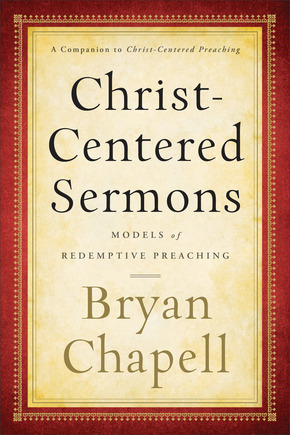Reviewed by Micah McCormick
Bryan Chapell, long time pastor and seminary professor, writes Christ-Centered Sermons in order to provide examples of the principles he wrote about in his book, Christ-Centered Preaching. As such, Christ-Centered Sermons is essentially a collection of various sermons, organized by type and sprinkled with footnotes that inform readers of the principles in play. Even though Christ-Centered Sermons is a companion volume to Christ-Centered Preaching, one need not have read the latter to appreciate the former—Christ-Centered Sermons begins with a twenty page introduction that summarizes Christ-Centered Preaching.
Christ-Centered Sermons contains thirteen sermons that are divided into three main categories which form the three main parts of the book. Part 1, “Structure,” offers four examples—Chapell’s formal format, reduction format, inductive format, and a special occasion topical message. Part 2, “Biblical Theology,” offers five examples—predictive, preparatory, reflective, resultant macro, and resultant micro. Part 3, “Gospel Application,” offers four sermons—two on the indicative-imperative dynamic, one on union with Christ, and a concluding sermon on the topic of preaching.
If all of that sounds rather dry and academic, readers will be delighted to discover that the sermons certainly aren’t. Reading these sermons reveals why Chapell is such a beloved homiletics professor and pastor—they are simple, clear, direct, and saturated with the gospel. Along with the variety of different sermon structures, Chapell turns a number of phrases at times memorable (“God can use rotten eggs to make a wonderful omelette,” 51), humorous (“even the engineers in the congregation got misty eyed,” 112), and hopeful (“God uses broken vessels to pour out his glory,” 52). He even employs Waffle House cheese grits in the service of biblical truth (93).
In addition, the bracketed comments and footnotes help to explain why Chapell made certain decisions in his sermon construction. It’s a bit like watching a sports clip where the frame is frozen at various points so the commentator can explain the play in more detail. Chapell also takes some space to address criticisms of his “Christ-centered” approach, and while he defends his emphases he makes no pretense of being the perfect preacher—in one sermon a footnote reveals that he is not entirely pleased with his conclusion and would change it if he had occasion to preach the sermon again (107).
The high point of the book remains the sufficiency of Christ and his glory as the chief note of preaching. Chapell does not reject all exemplary preaching outright, but he helpfully observes that exemplary preaching alone is not sufficient and that even the best human heroes in Scripture are flawed. He doesn’t permit an anything goes Christianity, but he reminds his hearers that the indicative gospel truths must come before the imperative commands.
As a pastor, I found myself at times vacillating between poles when I read this book. At times I probably over-scrutinized (how many different introductions should one sermon have?), and at other times I felt the hopeless realization that I will never be as effective a preacher as Chapell. At times I was scouring the book with the determination to labor to improve my preaching, and at other times I read devotionally with the trust that God works through his proclaimed Word regardless of the preacher. While these tensions no doubt stem from me as a reader, I trust that they also point to a book that is instructive and convicting, challenging and comforting. And although this book is more geared toward those who will preach, the sermons are indeed an encouragement for any who desire to look away from themselves to Christ.
Dr. Micah McCormick
Assistant Pastor
New Hyde Park Baptist Church
New Hyde Park, NY
Buy the books

Christ-centered Sermons: Models Of Redemptive Preaching